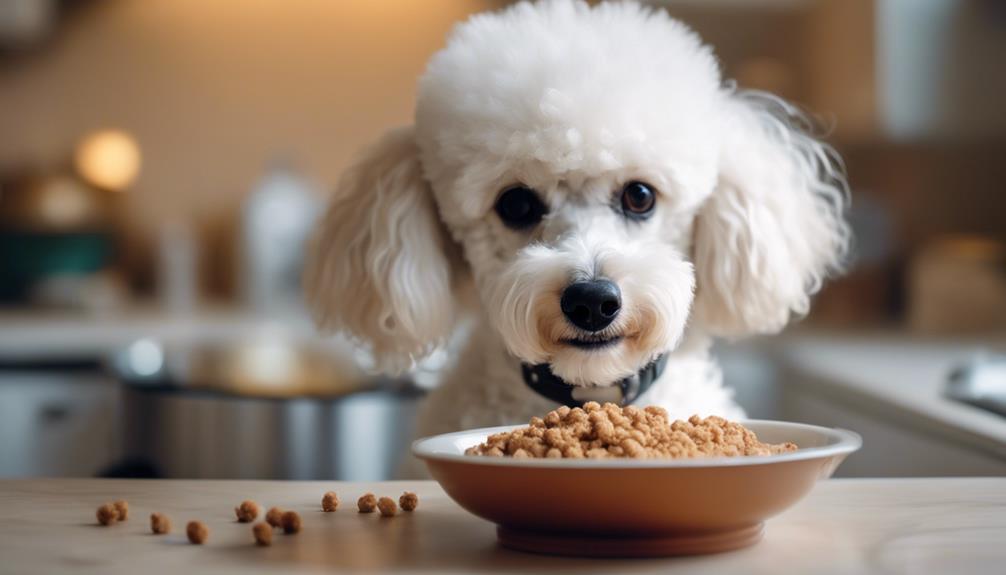When it comes to nourishing your poodle, finding the right balance in meal frequency can be crucial. But have you considered the impact of meal timing on their well-being? Understanding how often to feed your poodle is just the starting point; there are various factors to consider to ensure their health and happiness.
Key Takeaways
- Puppies: Feed 3-4 times daily for growth and energy.
- Adults: Feed twice daily to regulate metabolism.
- Seniors: Adjust feeding based on activity levels for health.
- Consistent feeding times crucial for Poodle well-being.
Feeding Frequency for Poodle Puppies
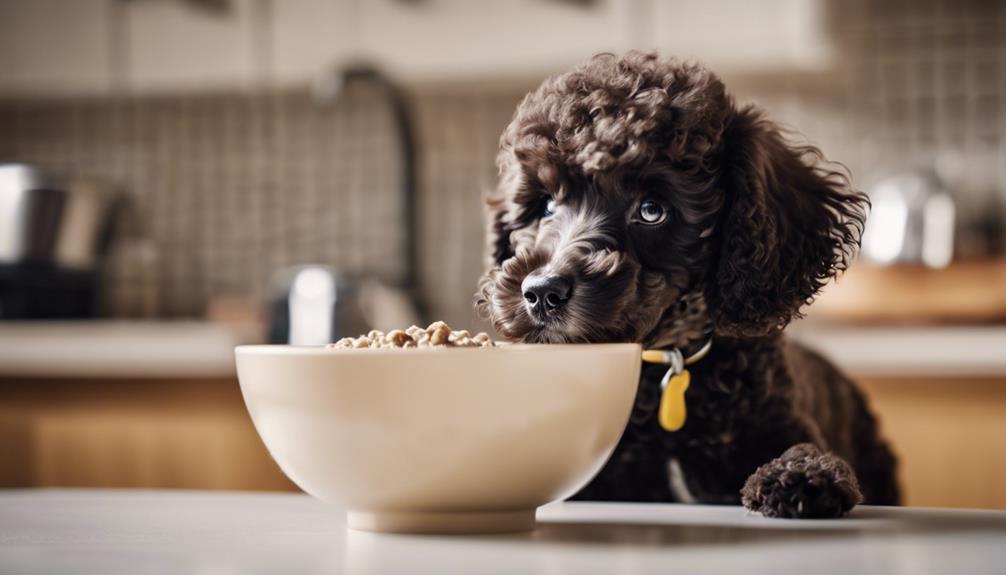
When raising a Poodle puppy, it's crucial to feed them 3-4 times a day to meet their growth and energy requirements effectively. Poodle puppies aged 8-9 weeks have high energy needs to support their development. Dividing their daily food into 3 or 4 small meals helps prevent overeating and provides a consistent source of energy throughout the day. This feeding frequency is essential as it ensures that your puppy receives the necessary nutrients without overwhelming their digestive system.
Optimal Feeding Schedule for Adult Poodles
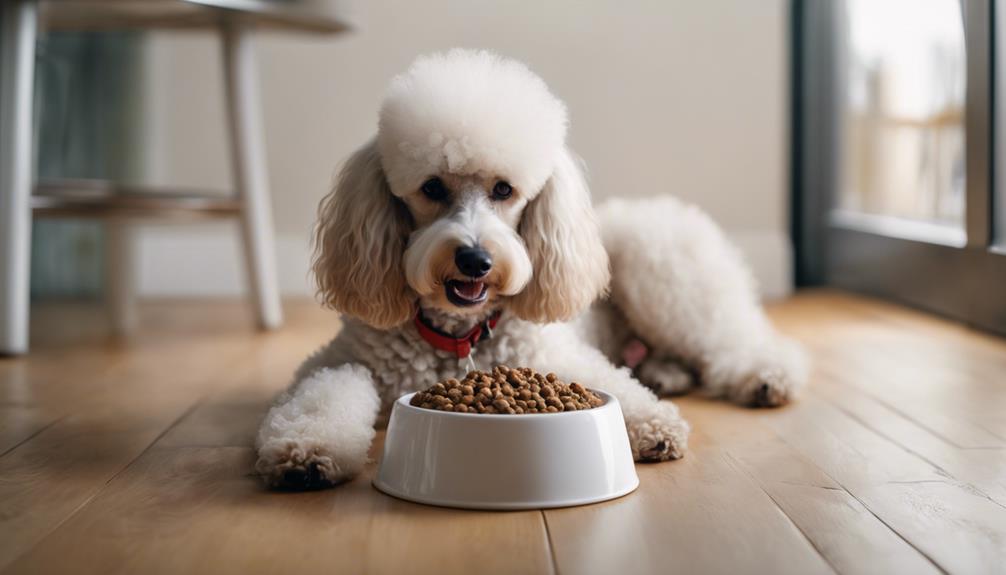
When considering the optimal feeding schedule for adult Poodles, it is essential to focus on daily feeding times, portion size guidelines, and the importance of water availability. By feeding your adult Poodle twice a day, you can help regulate their metabolism and prevent overeating. Monitoring these key aspects can contribute to maintaining your Poodle's health and well-being.
Daily Feeding Times
For adult Poodles, maintaining a balanced diet and preventing overeating is best achieved by feeding them two meals a day. Here are some reasons why this feeding schedule is beneficial:
- Regulate Metabolism: Splitting the daily food intake helps regulate your Poodle's metabolism and maintains consistent energy levels.
- Promote Good Behavior: Consistent feeding times can promote good mealtime behavior, reducing begging or scavenging tendencies.
- Monitor Health: Regular meals allow you to monitor your Poodle's appetite, digestion, and overall health more effectively.
- Prevent Overeating: By dividing their food into two meals, you can prevent your Poodle from overeating, which is crucial for maintaining a healthy weight.
Portion Size Guide
To ensure your adult Poodle maintains a healthy eating routine, it is crucial to determine the appropriate portion sizes for their optimal nutrition. Adult Poodles should be fed twice a day with calculated portion sizes based on their weight and activity level. This approach helps prevent overfeeding and obesity while ensuring your Poodle receives the necessary nutrients. Consistency in meal times is essential to regulate digestion and avoid potential digestive issues. Consulting with a veterinarian can provide valuable guidance in establishing the right portion sizes and feeding schedule tailored to your Poodle's specific requirements. By carefully measuring out the correct amount of dog food for each of the two meals per day, you can help maintain your Poodle's health and well-being.
Water Availability Importance
Ensuring constant access to fresh, clean water is vital for maintaining the optimal health and well-being of your adult Poodle. Here are some crucial points to consider about water availability: Providing clean water helps prevent dehydration, supports proper digestion, and aids in regulating body temperature, keeping your Poodle in peak condition. When planning your dog’s overall hydration and nutrition, pairing fresh water with a high-quality diet that includes some of the best wet dog foods for poodles can further enhance their health. Wet food options not only offer a flavorful and hydrating supplement but also ensure your Poodle gets a nutritious and balanced meal.
- Adult Poodles should always have access to fresh, clean water throughout the day to stay hydrated and aid digestion.
- Water availability is crucial for maintaining optimal health, regulating body temperature, and supporting organ function in adult Poodles.
- Dehydration can lead to serious health issues in Poodles, so it's essential to ensure they have constant access to water.
- Adequate water intake is especially important for Poodles fed dry kibble, as it helps prevent urinary tract problems and supports overall well-being.
Feeding Guidelines for Senior Poodles
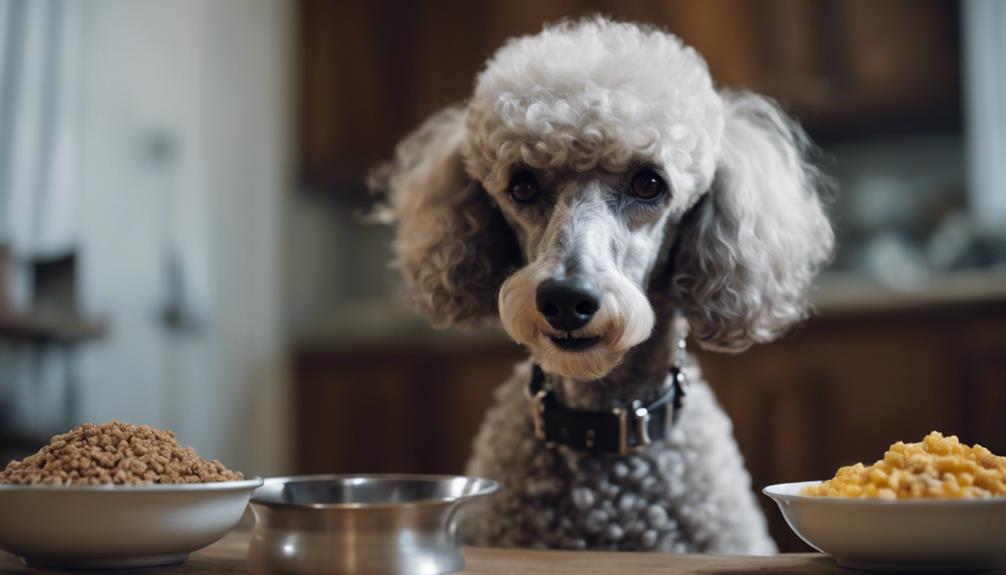
When feeding senior poodles, adjust their diet based on their activity levels and metabolism to ensure proper nutrition and weight management. Senior poodles may require fewer calories due to decreased activity levels, so it's essential to monitor their weight regularly. Consider feeding them smaller, more frequent meals if they struggle with digesting larger portions. Including high-quality protein sources in their diet is crucial to support muscle maintenance and overall health in their older years. Consulting with a veterinarian to create a customized feeding plan tailored to the specific needs of your senior poodle is highly recommended. By staying attentive to their changing dietary requirements and making adjustments accordingly, you can help your senior poodle maintain a healthy weight and overall well-being throughout their golden years. Remember, your furry companion deserves the best care possible, especially as they age, so prioritize their nutritional needs with care and attention.
Importance of Consistent Feeding Times
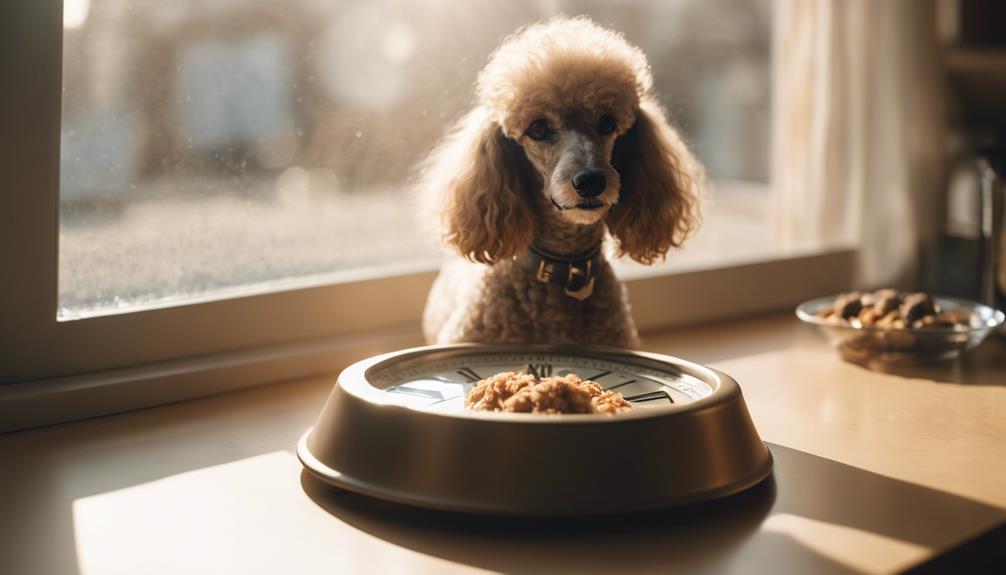
Maintaining consistent feeding times for your Poodle is crucial for regulating their metabolism and preventing digestive issues. By establishing a routine, you can promote good behavior and reduce food-related anxiety in your furry companion. Ensuring that mealtime occurs at predictable intervals not only provides a sense of security for your dog but also aids in monitoring their appetite and establishing bathroom habits.
Regular Feeding Schedules
Establishing a regular feeding schedule for your poodle is crucial for maintaining digestive health and preventing overeating. Consistent feeding times play a vital role in regulating your poodle's metabolism and energy levels, contributing to their overall well-being. Here are four reasons why regular feeding schedules are essential for your furry friend:
- Reduced Stress: Poodles thrive on routine, and feeding them at the same times each day can help reduce their stress and anxiety levels.
- Improved Training: Scheduled meals aid in housebreaking and training by establishing predictable bathroom habits.
- Appetite Monitoring: Consistent feeding times allow you to monitor your poodle's appetite, ensuring they receive the necessary nutrition.
- Health Maintenance: By following a regular feeding schedule, you can help prevent digestive issues and maintain your poodle's health.
Establishing Feeding Routine
Consistency in feeding times plays a crucial role in fostering your Poodle's overall well-being and digestive health. Establishing a feeding routine helps regulate your Poodle's digestive system, maintain a healthy metabolism, and reduce stress. Poodles thrive on routine, so feeding them at the same times each day promotes good behavior. Consistent feeding times also enable you to monitor your Poodle's appetite effectively, allowing you to detect any changes that may indicate underlying health issues. By sticking to a regular feeding schedule, you can prevent issues like overfeeding or underfeeding, supporting your Poodle in maintaining a healthy weight. Training your Poodle to expect meals at specific times enhances their overall well-being, creating a sense of security and predictability for your furry companion.
Timing for Mealtime
To ensure optimal digestion and overall well-being for your Poodle, maintaining consistent mealtime schedules is crucial. Here are some key reasons why sticking to a routine for feeding times is essential for your furry friend:
- Regulate Digestion: Consistent feeding times help regulate your poodle's digestion and maintain a routine.
- Prevent Overeating: Regular meal schedules can prevent overeating and obesity in poodles.
- Reduce Stress: Poodles thrive on predictability, so feeding them at the same times each day can reduce stress.
- Aid in Training: Establishing set meal times can aid in housebreaking and potty training for your poodle.
Adjusting Meal Frequency for Pregnant Poodles
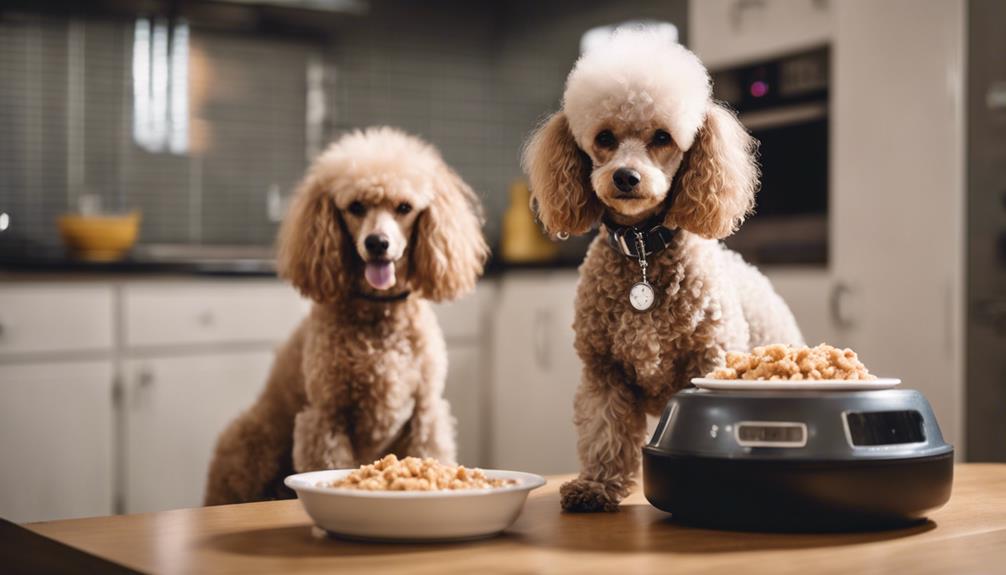
Adjust the meal frequency for your pregnant Poodle by offering smaller, more frequent meals throughout the day to support the developing puppies. Pregnant Poodles have increased nutritional needs to sustain both themselves and their growing litter. Consult your veterinarian to establish the most suitable feeding schedule for your pregnant Poodle, taking into account factors like her size, age, and stage of pregnancy. By providing multiple smaller meals, you can ensure that your Poodle receives a steady supply of nutrients without overloading her digestive system. It's crucial to monitor her weight and body condition regularly, adjusting the meal frequency as necessary to maintain her health and that of the developing puppies. Additionally, always keep fresh water available for your pregnant Poodle to stay hydrated, a vital aspect of her overall well-being during this critical time. By prioritizing her nutrition and wellness, you can help ensure a healthy pregnancy and delivery for your beloved Poodle.
Feeding Frequency for Poodles With Health Conditions
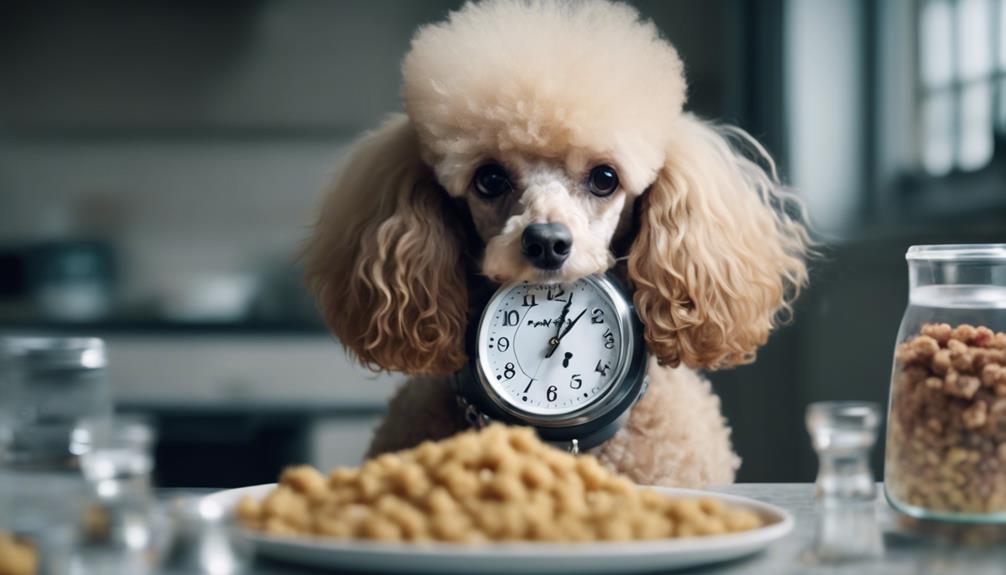
When managing health conditions in your Poodle, consider adjusting their feeding frequency to smaller, more frequent meals as recommended by your veterinarian for optimal health outcomes. Here are some essential points to keep in mind: Avoid overfeeding, as maintaining a healthy weight is crucial for preventing joint problems and other obesity-related issues. Additionally, ensure their meals are nutritionally balanced and tailored to their specific needs, as outlined in poodle diet recommendations. Regularly consult your veterinarian to adjust their diet based on age, activity level, and any existing health concerns. Proper hydration is equally important, so always provide fresh, clean water alongside their meals to support overall health and digestion. When selecting the best dry dog foods for poodles, prioritize options with high-quality ingredients and avoid fillers or artificial additives that could trigger sensitivities. By combining a carefully planned diet with regular check-ins with your veterinarian, you can ensure your Poodle thrives at every stage of life.
- Tailored Feeding Schedule: Poodles with health conditions may require more frequent, smaller meals to effectively manage their specific health needs.
- Consultation is Key: Consult with your veterinarian to determine the ideal feeding schedule that suits your poodle's health condition.
- Benefits for Certain Conditions: Dogs with diabetes, pancreatitis, or gastrointestinal issues may benefit from more frequent feedings to stabilize blood sugar levels and aid digestion.
- Specialized Diets: Some health conditions necessitate specialized diets that must be divided into multiple small meals to prevent complications or flare-ups.
Factors Influencing Poodle Feeding Frequency
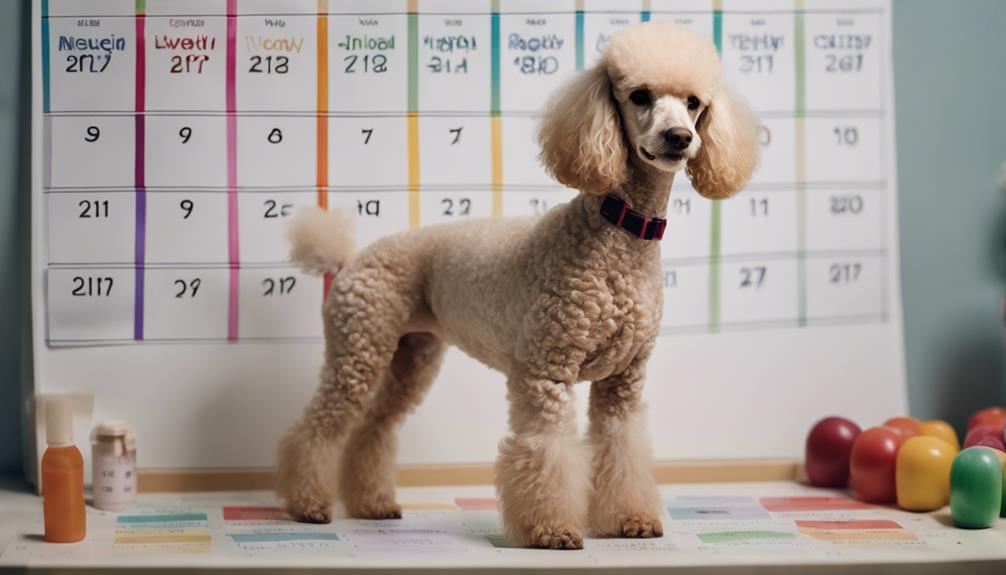
Factors such as age, size, and activity level play a crucial role in determining the most suitable feeding frequency for your Poodle. When it comes to puppies, their rapid growth and high energy demands necessitate more frequent meals compared to adult poodles. Puppies generally do well with three to four small meals a day. Adult poodles, on the other hand, typically thrive on a feeding schedule of two meals per day. Additionally, specific health conditions like diabetes or obesity may require a customized feeding frequency to manage these issues effectively. Consulting with a veterinarian is essential to establish the optimal feeding routine tailored to your poodle's individual requirements. By considering these factors and seeking professional advice, you can ensure that your Poodle receives the appropriate nutrition and feeding frequency to support their overall health and well-being.
Feeding Poodle Puppies for Growth
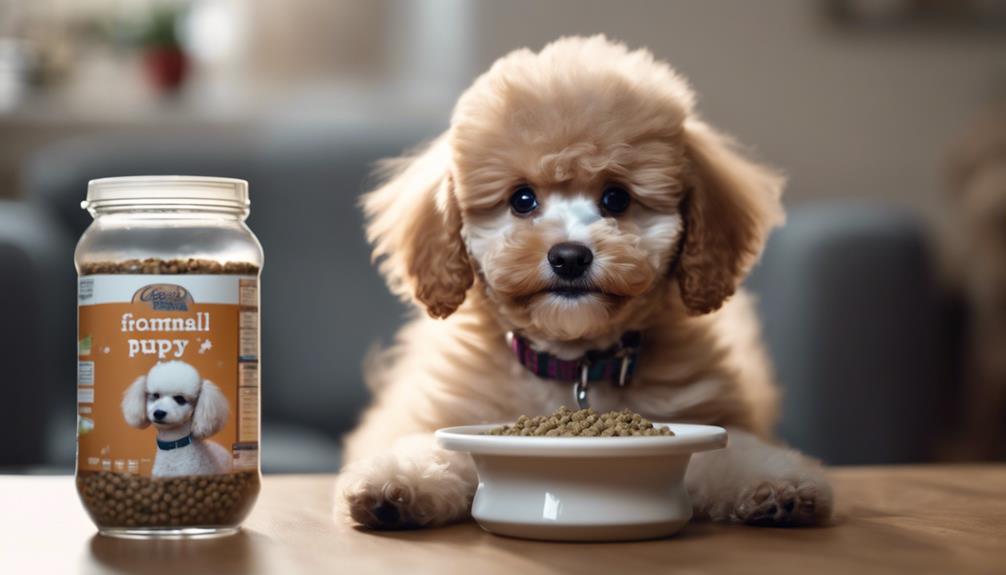
When feeding your Poodle puppy for growth, remember that pups aged 8-9 weeks need to eat 3-4 times a day to support their rapid development. It's essential to adjust meal frequencies and portion sizes based on your puppy's individual needs to ensure they receive proper nutrition without overfeeding. Gradually transitioning your puppy to new foods over several weeks can help prevent stomach upset and promote healthy growth.
Poodle Puppy Nutrition
To support the rapid growth and development of your Poodle puppy, it is essential to feed them 3-4 times a day when they are 8-9 weeks old. This ensures they receive the necessary nutrition for their growth phase. Here are some guidelines to consider:
- Divide Meals: Splitting their daily food into 3-4 meals helps in proper digestion and absorption.
- Adjust Portions: Tailor the amount fed based on your puppy's body condition to prevent health issues.
- Transition Slowly: Gradually introduce new food over a few weeks to avoid digestive upsets.
- Monitor Carefully: Watch for signs of stomach upset during dietary changes, and consult a vet promptly if needed.
Growth Phase Feeding
To maximize the growth potential of your Poodle puppy, ensure they are fed 3-4 times a day with appropriate portion sizes tailored to their body condition. Setting your puppy on the right food intake path is crucial during this growth phase. Here is a helpful table to guide you in feeding your Poodle puppy:
| Age (Weeks) | Number of Meals | Portion Size |
|---|---|---|
| 8-9 | 3-4 | Adjust based on body condition |
| 10-12 | 3 | Tailor to individual needs |
| 13-16 | 3 | Monitor growth rate |
| 17-20 | 3 | Consult vet if unsure |
| 21-24 | 2-3 | Maintain healthy diet |
Meal Timing for Poodle Training
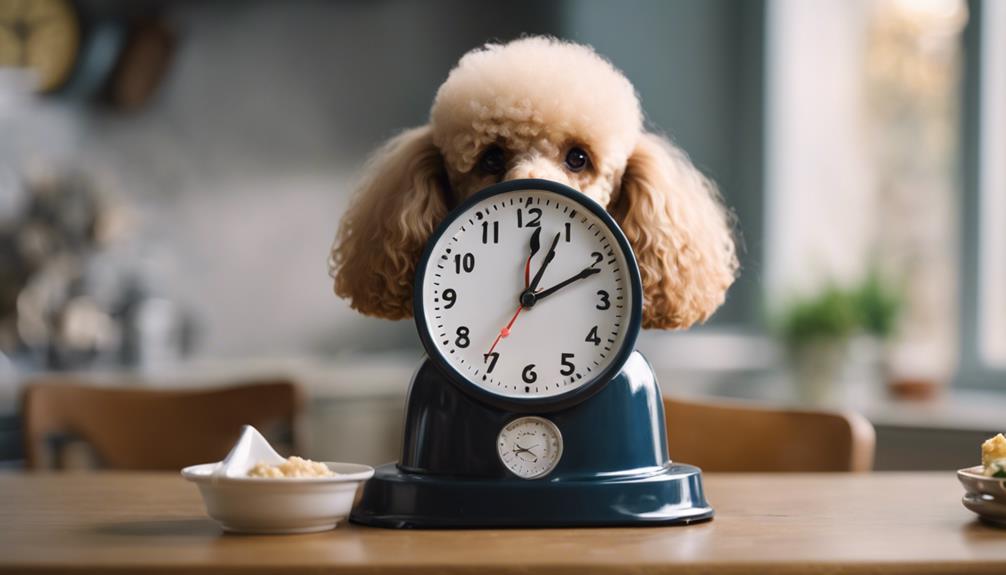
Establish a consistent meal schedule for your poodle during training to reinforce positive behaviors and enhance bonding opportunities. Here are some key points to consider: Ensure meals are served at the same times each day to create structure and help your poodle anticipate their routine. This predictability not only supports training efforts but also promotes good digestion and overall well-being. For those new to the moyen poodle breed explained, these medium-sized dogs benefit greatly from consistency and thrive when their physical and mental needs are met with regular schedules.
- Consistency is Key: Stick to set meal times each day to create a routine for your poodle. This routine can help them anticipate training sessions and foster a sense of security.
- Training Integration: Use meal times as training opportunities to reward good behaviors. Incorporating training into meal times can reinforce commands and strengthen the bond between you and your poodle.
- Timing Matters: Avoid feeding your poodle right before or after intense training sessions to prevent stomach upset. Allow some time between meals and training activities for optimal digestion and focus.
- Adjust to Your Poodle: Monitor your poodle's energy levels and response to training. Adapt meal timing based on their needs and reactions to ensure they are at their best during training sessions. By aligning meal schedules with daily routines and activity levels, you can maximize the effectiveness of your poodle's training.
Meal Frequency for Toy Poodle Breeds
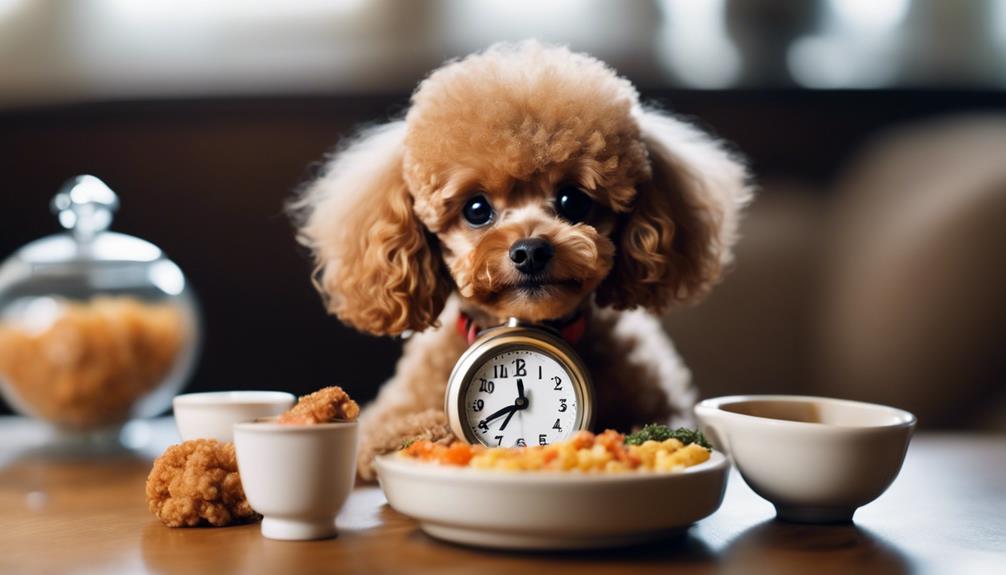
Feeding frequency plays a crucial role in supporting the growth and health of toy poodle puppies. These tiny bundles of energy typically require 3-4 small meals throughout the day to sustain their rapid development. As toy poodle puppies reach around 6 months of age, transitioning to 2 meals a day is suitable for their changing needs. Offering small, frequent meals to toy poodles is beneficial as it helps maintain their energy levels and prevents conditions like hypoglycemia. Due to their small stomachs, dividing their daily food intake into multiple feedings can aid in digestion and prevent issues like bloating. It is essential to monitor your toy poodle's body condition and adjust their food amount accordingly to ensure they stay healthy and thrive. By providing the right meal frequency and portion sizes, you can contribute significantly to the well-being of your beloved toy poodle.
Feeding Schedule for Miniature Poodles
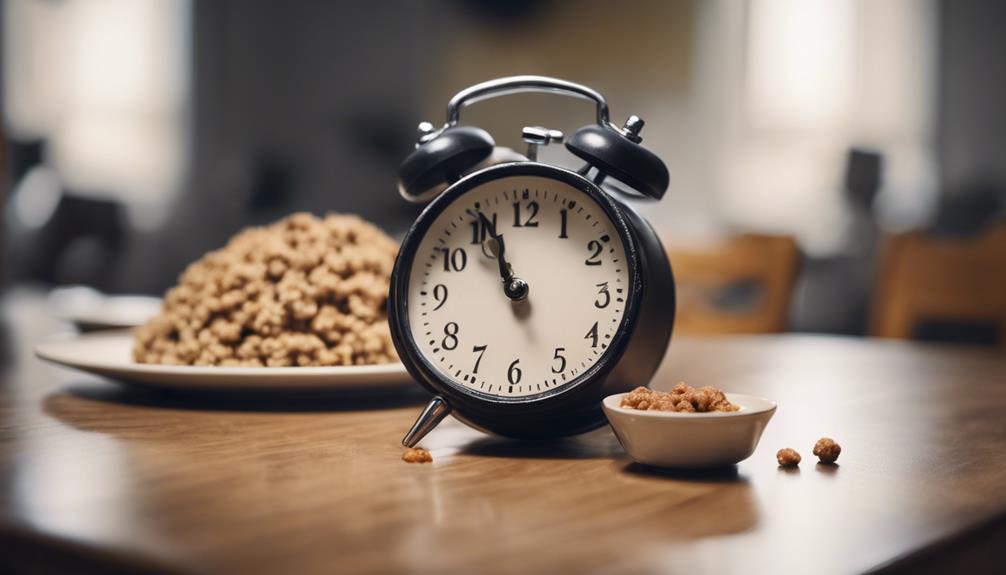
When considering the well-being of your Miniature Poodle, it is essential to establish a consistent meal schedule that aligns with their activity level and metabolism. Here are some key points to keep in mind:
- Two Meals a Day: Miniature Poodles should ideally be fed two meals a day to maintain a healthy weight and prevent overeating. This schedule helps regulate their metabolism and energy levels throughout the day.
- Portion Control: Adjust the portion sizes according to your dog's activity level and body condition. Avoid overfeeding, as excessive weight gain can lead to obesity and related health issues.
- Monitoring Weight Loss: Keep an eye on your Miniature Poodle's weight to ensure they are not losing weight unexpectedly, as this could be a sign of an underlying health problem. Sudden weight loss should prompt a visit to the veterinarian for evaluation.
- Watch for Signs of Illness: Be vigilant for any signs of illness such as changes in appetite, lethargy, or digestive issues. If you notice any concerning symptoms, consult with your vet promptly to address any potential health issues.
Monitoring Poodle's Weight Through Feeding
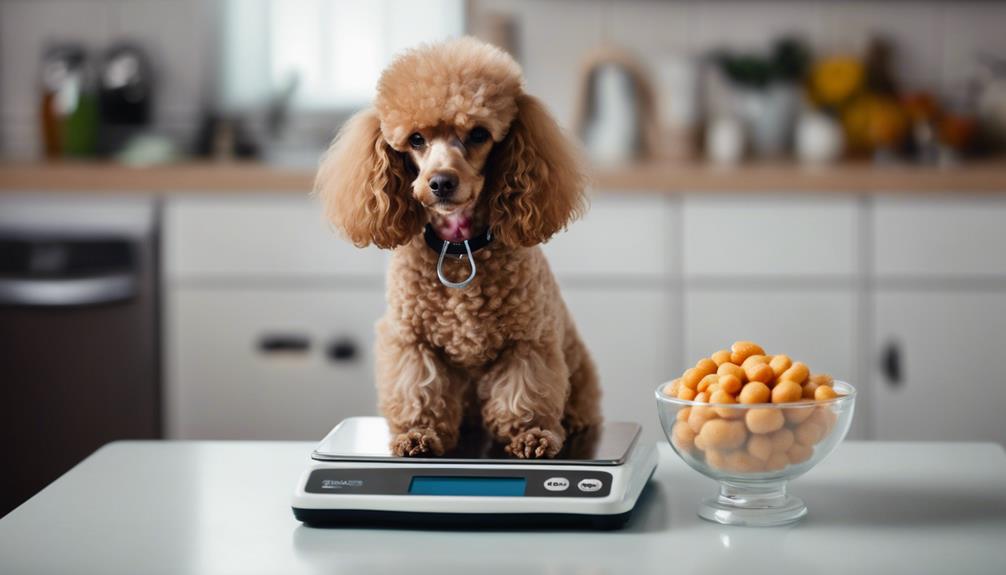
Regularly weighing your poodle on a scale designed for pets is crucial for monitoring their weight through feeding. By keeping track of your poodle's weight changes, you can effectively manage their growth and overall health. If you notice sudden weight gain or loss, consulting with your veterinarian is recommended to address any potential concerns promptly. Adjusting the feeding amount according to your poodle's weight and body condition score is essential for maintaining their optimal health. Regularly assessing your poodle's body condition allows you to ensure they are at a healthy weight and make any necessary adjustments to their feeding regimen. This proactive approach to weight monitoring, feeding amount adjustment, and body condition assessment will help you provide the best care for your poodle, promoting their well-being and longevity.
Frequently Asked Questions
How Many Cups of Food Should I Feed My Poodle?
To determine how many cups of food to feed your Poodle, consider portion control, feeding guidelines, and their nutritional needs. Monitor their body condition and weight, adjusting as needed based on size and activity level.
What Time Should Poodles Eat?
Establish a feeding routine for your poodle to maintain energy levels and regulate digestion. Consistent meal timing and portion control are key. Feed morning and evening meals, avoiding late-night feedings to prevent discomfort. Additionally, monitor your poodle’s weight and adjust portion sizes as needed to keep them at an ideal body condition. If you’re considering preparing meals at home, explore reliable homemade diet tips for poodles to ensure their nutritional needs are met. Always consult your veterinarian before making significant changes to your pet’s diet or routine. Proper hydration is also crucial, so ensure your poodle has access to fresh water throughout the day, especially during and after meals. When exploring homemade diet recipes for poodles, focus on incorporating a balance of proteins, healthy fats, and carbohydrates to support their overall health and vitality. Keep an eye out for any signs of food sensitivities or allergies, and work closely with your veterinarian to tailor a diet plan that suits your poodle’s specific needs.
Is It Better to Feed Dogs Once a Day?
Eating once a day may not be ideal for dogs. Meal frequency impacts digestion, energy levels, and behavior. Veterinarians suggest feeding dogs at least twice daily for optimal health. Splitting meals helps regulate blood sugar and supports overall well-being.
What Is the Best Feeding Schedule for Dogs?
When deciding on the best feeding schedule for dogs, consider portion control, food quality, and feeding frequency. Veterinarians suggest at least two meals daily for adult dogs to maintain a balanced diet and overall health.
Conclusion
As you navigate the feeding schedule for your precious poodle, remember that consistency is key to their health and happiness. Like a well-tuned machine, feeding them at regular intervals ensures they receive the nourishment they need to thrive. By following a structured feeding plan tailored to their age and size, you are laying the foundation for a healthy and fulfilled life for your beloved companion. Stay on track, and watch your poodle flourish like a vibrant garden in full bloom. Additionally, be mindful of common poodle feeding mistakes to avoid, such as overfeeding or offering too many table scraps, which can lead to weight gain and digestive issues. Providing a balanced and nutritious diet in the right proportions is essential to meet their unique dietary needs. By staying informed and attentive, you can ensure your poodle remains energetic, joyful, and in optimal health for years to come. To further support your poodle’s health, consider incorporating healthy treats and chews into their diet, as these can provide enrichment and help maintain dental hygiene. Selecting the best dog bones for poodles is an excellent way to satisfy their natural chewing instincts while promoting strong teeth and gums. Always choose options that are safe, durable, and suitable for their size to ensure mealtime and snack time remain both enjoyable and beneficial for your furry friend. Moreover, investing in the best dog bowls for poodles can make a significant difference in their feeding experience, promoting proper posture and reducing issues like bloating or strain. Opt for bowls that suit their size and eating style, whether it’s a slow feeder to prevent gulping or an elevated bowl for added comfort. By combining these thoughtful choices with your consistent care, you’ll be giving your poodle the very best start to a long and vibrant life. Remember to incorporate training sessions or bonding moments with your poodle around mealtime, as this can further reinforce positive behavior and create a deeper connection between you and your furry friend. Treats can also play a vital role in reward-based training, but it’s important to choose options that align with their dietary needs—exploring the best poodle treats recommendations can help you find healthy, high-quality options that won’t compromise their nutrition. A little extra love and attention to their diet can make all the difference in ensuring your poodle’s tail keeps wagging with joy every single day.
